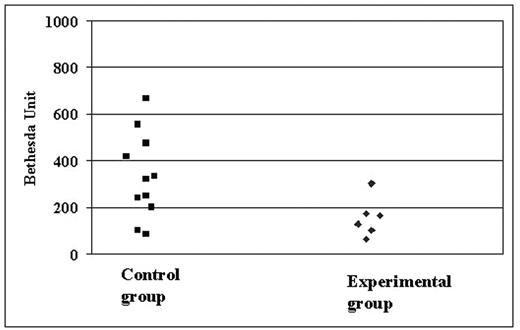Abstract
Approximately 30% of patients with severe hemophilia A develop neutralizing antibodies (inhibitors) to factor VIII (FVIII). Frequently, the inhibitors that develop are persistent and of sufficiently high titer that infusion of FVIII concentrates are ineffective for the control of bleeding episodes. At present the only method for elimination of high titer inhibitors is Immune Tolerance Induction (ITI) by exposing patients to repeated FVIII doses. However, it is extremely expensive and takes many months to complete. There is a need to develop quicker, cheaper, and more reliable protocols for inducing tolerance in patients with high titer FVIII inhibitors, and of preventing their occurrence in patients at high risk.
In a non-inflammatory environment, autologous apoptotic cells are processed by immature, non-activated dendritic cells (DCs) capable of initiating peripheral immune tolerance through the stimulation of different classes of regulatory T cells. Furthermore, it has been demonstrated that antigen specific tolerance can be induced by delivery of a foreign protein within dying syngeneic cells (
We generated a fibroblast cell line from a tail snip of a 129Sv-FVIIIKO mouse and transduced the cells with a foamy virus vector expressing a B-domain deleted human FVIII construct. Expression of human FVIII was detected by ELISA in the supernatant of cultured transduced fibroblasts. These transduced cells were induced to apoptosis by serum starvation for 24–30 hr prior to infusion into 129Sv-FVIIIKO mice. Treated mice received two weekly doses of 1x107 serum starved transduced fibroblasts. Control mice were infused with culture media alone. Ten days after the final infusion, experimental and control mice were challenged with 4 weekly intravenous doses of 0.2 μg albumin free recombinant human FVIII (ADVATE). Ten days after the final dose of ADVATE blood samples were collected and evaluated for inhibitor titer by Bethesda assay and for total anti-FVIII antibody titer by ELISA. Three weeks later, T cell proliferation assays were performed on samples from mice in each group. The mice that received apoptotic cells had lower inhibitor titers than controls, 156.7 ± 82.7 BU/ml (n = 6) versus 331.3 ± 183.9 BU/ml (n = 11) (p = 0.017, Welch’s t-test). However, total antibody titer levels determined by ELISA were not significantly different between the two groups. T-cell proliferation assays also showed a reduced T cell response in the apoptotic cell treated mice with a stimulation index that was half that seen in the controls.
Our data show that inhibitor titers and T cell responses in hemophilia A mice challenged by albumin free recombinant FVIIII can be reduced by the prior infusion of apoptotic syngeneic cells transduced with a human FVIII expressing vector. Future work will focus on optimizing apoptotic cell delivery protocols to maximally suppress the immune response to FVIII and on elucidating the mechanisms responsible for our findings.
Author notes
Corresponding author


This feature is available to Subscribers Only
Sign In or Create an Account Close Modal